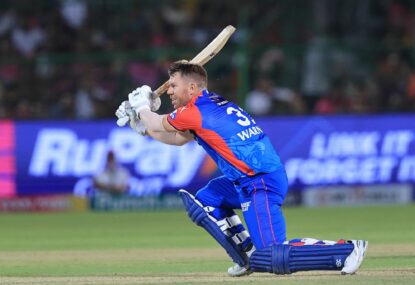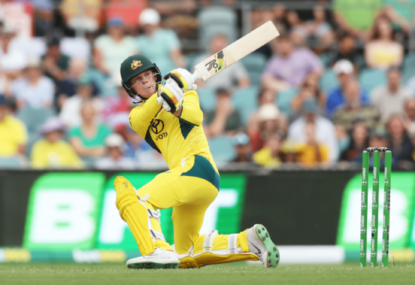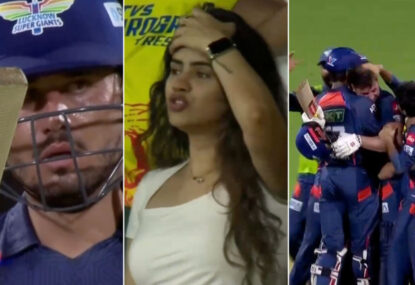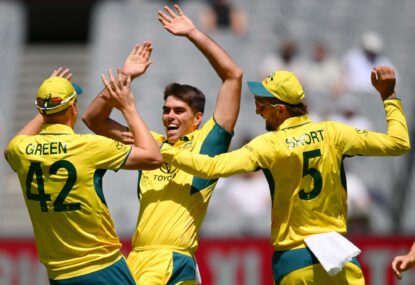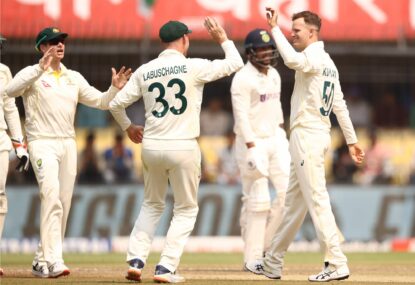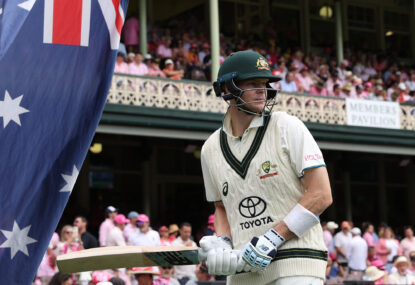The World Cup 2019 could not have asked for a better finale to cap off a wonderful event.
A mostly one-sided match quickly turned into a nail-biting contest towards the closing stages culminating in the best ever final of a World Cup and arguably the greatest ODI ever.
Pacemakers and heart surgeons were the need of the hour as the drama that unfolded towards the end was a never-seen-before event.
The contest ended though without either of the combatants – England or New Zealand – actually losing the match, yet there was a winner at the end of it all. In the most controversial of endings, hosts England emerged triumphant while New Zealand was left to rue another missed opportunity and a second successive finals defeat.
There were many such highs and lows during the month-and-a-half-long extravaganza and we look back at the most memorable moments from the latest instalment of the game’s showpiece spectacle.
The Cup comes home
After a humdinger of a contest, where fortunes swung so wildly back and forth that a yo-yo would have ended up with a migraine, the creators of this great game finally won the trophy that really matters – The World Cup.
While the English women had already won it two years prior, the men had constantly returned empty handed going back to the men’s first 50 over World Cup in 1975.
The world’s top ranked ODI side and pre-tournament favourite, England, eventually delivered in a final, after having failed on three previous attempts.
The Three Lions were the best team over the month and a half long event and were deserving winners, even if the manner of their victory will have fans divided for many years to come.
New Zealand on winning the toss elected to bat and scored 241 for 8 in their allotted overs. In response the English were well ahead for most of the game before the kiwis pulled things back and squeezed the opposition before Ben Stokes hit the runs that secured a tie in regulation time for the hosts.
A super over was enforced to separate the two contestants but even that failed to see either team outscore the other as both teams ended on 15 runs at the end of the super over.
However, as per the tournament’s rules, in the event of a tie at the end of a super over, the team that scored the maximum boundaries throughout the match would be declared the winners, and it was this factor that saw England winning the game and the title.
Skipper Eoin Morgan’s vision, which took shape after England’s unceremonious exit at the last edition, and was four years in the making, finally came to fruition as he lifted the trophy that will come to define his team’s and his legacy. England were crowned Champions of The World!
New Zealand’s ‘wolf pack’ mentality and amazing grace
The tiny nation of New Zealand has produced some of the greatest cricketers to have ever played the game like Sir Richard Hadlee, the late Martin Crowe, Glenn Turner and current skipper Kane Williamson to name a few.
But they have been few and far between to really form a side capable of challenging for top honours in this sport.
Yet the Kiwis have made it to the final four on no less than 8 out of the 12 times that they have contested in the tournament, which is a phenomenal achievement in itself.
‘New Zealand always punch above their weight’ has become the great cliché of this sport, yet it is the biggest compliment you can ever heap on this tribe of warriors.
They are aware that they’re bereft of the constellation of stars that other teams are blessed with, but what they’re even more aware of is their strength and that is to play as a team.
Their ‘wolf pack’ mentality has seen them take down many a stronger opponent over their cricketing history and it was once more on full display at the quadrennial event. They hustled their way past Asian giants India in the semi-final and almost accounted for eventual champions England in the final as well, with their awesome tenacity and pressure building tactics.
The Black Caps also showed another side to their great sporting spirit when they accepted their fate with dignity.
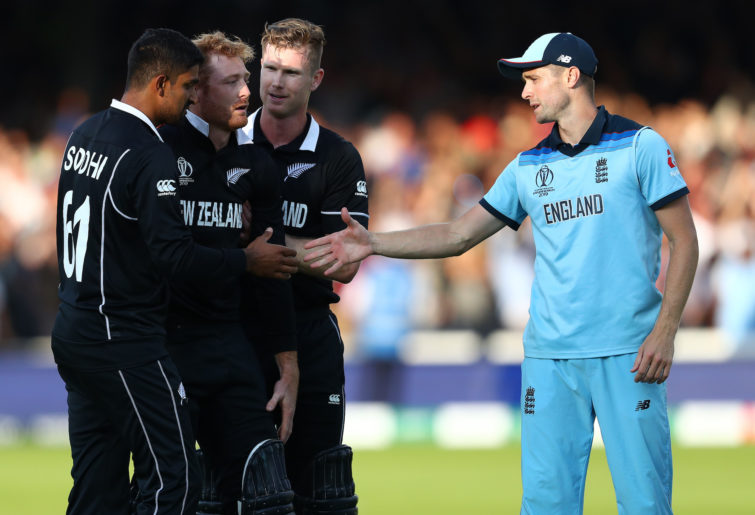
Chris Woakes consoles the vanquished Kiwis after their World Cup thriller. (Michael Steele/Getty Images)
Heartbroken and crestfallen, the Kiwis refused to blame anyone or anything for their ill-fated luck. Whether it was the ricochet of Ben Stokes bat that cost them an additional five runs, or the ‘boundary countback’ that sealed their fate, the Island Warriors took everything in their stride and conducted themselves in the most gracious and courageous manner.
They showed the world that even under the most agonising of circumstances, it is possible to conduct oneself with great dignity and rare courage. The English may have been crowned Kings of The World but it was the Kiwis that were undeniably The Queen of Hearts.
Kane and very able
New Zealand captain Kane Williamson proved that he was not only his team’s talismanic player but also its more than able leader.
The Kiwi skipper was rightly adjudged ‘Player of the Tournament’ for not just his 578 runs but also his astute captaincy which saw his side come within a whisker of being crowned World Champions. In a team comprising largely of two consistently performing assets, with the Black Caps captain being the mainstay of the batting department and Trent Boult, the leader of the bowling unit, Williamson led them to the finals over more fancied oppositions like India and South Africa.
His tactical acumen during the tournament irrefutably placed him in the upper echelons of the most strategic captains in the game, as he plotted his team’s way to the summit clash.
Who can forget his pressure building tactics against India in the semi-finals and more recently, in the final, using the same ploy to stifle the Englishmen towards the later part of their innings? But for him, New Zealand would never have made back-to-back finals, let alone have a chance of getting their hands on the trophy for the very first time.
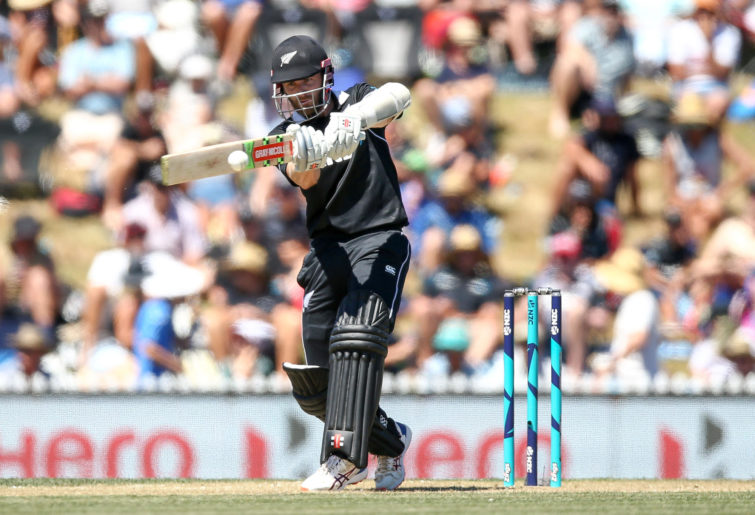
Kane Williamson of New Zealand (Photo by Hagen Hopkins/Getty Images)
Rules are meant to be broken… or in this case changed
The greatest final in the history of the men’s game ended in the most controversial manner imaginable – a victorious team on the basis of a ‘boundary countback’!
After 102 overs of high-octane nerve-wracking playtime, both teams ended on exactly the same score – 241 after normal play and then 15 runs after the super over.
Yet at the end of it all England were declared winners by virtue of hitting more boundaries over the course of the match (regular innings + super over combined). It was the most bizarre end to a fascinating contest.
How could you declare a winner based on the number of boundaries hit? Even the previous rule of declaring a winner based on the least number of wickets lost in scoring the same amount of runs, signalling efficiency, had more merit than what was used to decide the winners of the most important short-form tournament in the cricketverse.
There are a lot of weird rules in the game but this one definitely takes the cake.
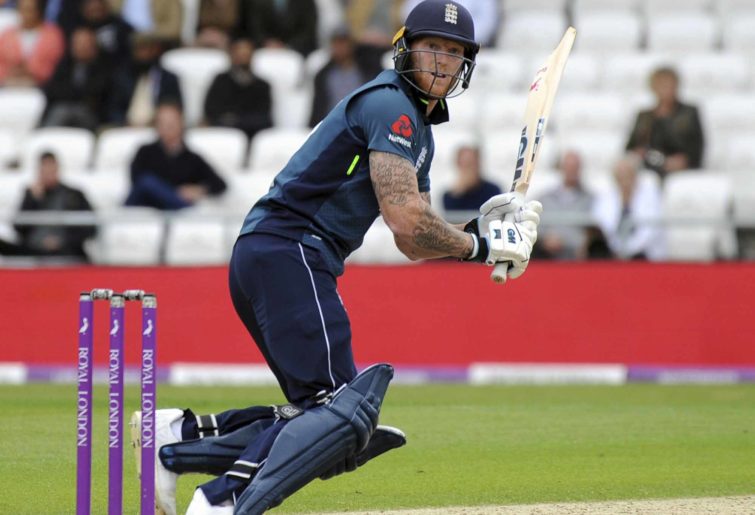
Ben Stokes of England. (AP Photo/Rui Vieira)
The ricochet rule off the batsman’s body or paraphernalia also needs to be revisited. Why should a fielding team be penalised runs when all they were trying to do was run-out the batsman and not needlessly throw the ball or with the intention to cause harm to the batsman?
This obscure rule cost New Zealand four or five extra runs, when the ball ricocheted off Ben Stokes’ bat to the boundary, which went on to prove decisive in the end.
The MCC (The Marylebone Cricket Club) who are the custodians of the rules and the laws of the game and The ICC (International Cricket Council), the governing body of the sport, have to intricately review the rules and laws that govern this game and to find the best possible solutions to every possible scenario that is worthy of its various stakeholders and of it being a truly global game.
The men in red and black
The match officials at The World Cup had a tournament to forget indeed. Right from the battle of the ‘Chrises’ – Gayle and umpire Gaffney – where the player won two out of three decisions contested to Kumar Dharmasena’s shocking decision of Jason Roy and the ricochet six-run gaffe in the final, it was indeed an event the so called elite umpires of world cricket wouldn’t want to remember for a long time to come.
While the poor umpiring decisions in the Gayle and Roy incidents were to have no major consequences on the final results of those respective games, their more glaring mistakes in the knock-out games were to have a lasting impact on the competition.
First up was M.S. Dhoni’s run-out in the semi-finals – the ball before the run-out in which a graphic was shown that had six fielders outside the 30-yard circle during the powerplay when only five are allowed.
This would have then been called a no ball, which would have ensured that the dismissal delivery would have actually been a free-hit (of course Dhoni could still be run out off a no ball, but the chance of him running on a no ball would have been slim).
This crucial error at such an important juncture in a semi-final could have altered the result altogether. India could have still lost but the fact that the umpires missed something as basic as the number of fielders in the ring in a huge match is disappointing to say the least.
The ricochet off Ben Stokes’ bat, which then headed off to the boundary in the grand final was the other glaring error that ultimately proved decisive in the match’s final outcome. The law clearly states that in the act of the overthrow, for the run in progress to be counted, the batsmen should have crossed when the fielder has released the ball, which was clearly not the case in the Stokes incident.
The umpires awarded England six runs instead of 5, which if they had not done, could have resulted in New Zealand running out winners by a solitary run in regulation time.
Such poor umpiring at crucial junctures does the game no favours. The cricket world cries out for the return of one Mr Simon Taufel to The ICC panel of elite umpires to ensure that the transgressions of this edition do not repeat itself in four years time.
In the next instalment, we continue with our reflections on The World Cup 2019…

































































































